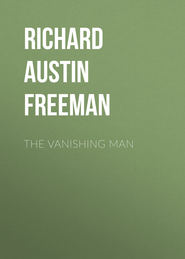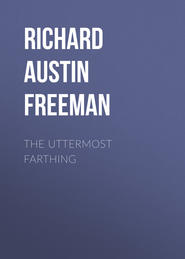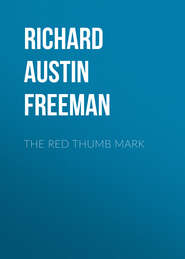По всем вопросам обращайтесь на: info@litportal.ru
(©) 2003-2024.
✖
The Eye of Osiris
Настройки чтения
Размер шрифта
Высота строк
Поля
"You notice," said Thorndyke, "that my learned friend is pleased to indulge in mixed metaphors. But his statement is substantially true, though obscurely worded. You must tell us more about the Bellinghams when we have fortified you with a cup of tea."
Our talk had brought us to Thorndyke's chambers, which were on the first floor of No. 5A, King's Bench Walk, and as we entered the fine, spacious, paneled room we found a small, elderly man, neatly dressed in black, setting out the tea-service on the table. I glanced at him with some curiosity. He hardly looked like a servant, in spite of his neat, black clothes; in fact, his appearance was rather puzzling, for while his quiet dignity and his serious intelligent face suggested some kind of professional man, his neat, capable hands were those of a skilled mechanic.
Thorndyke surveyed the tea-tray thoughtfully and then looked at his retainer. "I see you have put three teacups, Polton," he said. "Now, how did you know I was bringing some one in to tea?"
The little man smiled a quaint, crinkly smile of gratification as he explained:
"I happened to look out of the laboratory window as you turned the corner, sir."
"How disappointingly simple," said Jervis. "We were hoping for something abstruse and telepathic."
"Simplicity is the soul of efficiency, sir," replied Polton as he checked the tea-service to make sure that nothing was forgotten, and with this remarkable aphorism he silently evaporated.
"To return to the Bellingham case," said Thorndyke, when he had poured out the tea. "Have you picked up any facts relating to the parties—and facts, I mean, of course, that it would be proper for you to mention?"
"I have learned one or two things that there is no harm in repeating. For instance, I gather that Godfrey Bellingham—my patient—lost all his property quite suddenly about the time of the disappearance."
"That is really odd," said Thorndyke. "The opposite condition would be quite understandable, but one doesn't see exactly how this can have happened, unless there was an allowance of some sort."
"No, that was what struck me. But there seem to be some queer features in the case, and the legal position is evidently getting complicated. There is a will, for example, which is giving trouble."
"They will hardly be able to administer the will without either proof or presumption of death," Thorndyke remarked.
"Exactly. That's one of the difficulties. Another is that there seems to be some fatal defect in the drafting of the will itself. I don't know what it is, but I expect I shall hear sooner or later. By the way, I mentioned the interest that you have taken in the case, and I think Bellingham would have liked to consult you, but, of course, the poor devil has no money."
"That is awkward for him if the other interested parties have. There will probably be legal proceedings of some kind, and as the law takes no account of poverty, he is likely to go to the wall. He ought to have advice of some sort."
"I don't see how he is to get it," said I.
"Neither do I," Thorndyke admitted. "There are no hospitals for impecunious litigants; it is assumed that only persons of means have a right to go to law. Of course, if we knew the man and the circumstances we might be able to help him; but for all we know to the contrary, he may be an arrant scoundrel."
I had recalled the strange conversation that I had overheard, and wondered what Thorndyke would have thought of it if it had been allowable for me to repeat it. Obviously it was not, however, and I could only give my own impressions.
"He doesn't strike me as that," I said; "but of course, one never knows. Personally, he impressed me rather favorably, which is more than the other man did."
"What other man?" asked Thorndyke.
"There was another man in the case, wasn't there? I forget his name. I saw him at the house and didn't much like the look of him. I suspect he's putting some sort of pressure on Bellingham."
"Berkeley knows more about this than he's telling us," said Jervis. "Let us look up the report and see who this stranger is." He took down from a shelf a large volume of newspaper cuttings and laid it on the table.
"You see," said he, as he ran his finger down the index. "Thorndyke files all the cases that are likely to come to something, and I know he had expectations regarding this one. I fancy he had some ghoulish hope that the missing gentleman's head might turn up in somebody's dust-bin. Here we are; the other man's name is Hurst. He is apparently a cousin, and it was at his house the missing man was last seen alive."
"So you think Mr. Hurst is moving in the matter?" said Thorndyke, when he had glanced over the report.
"That is my impression," I replied, "though I really know nothing about it."
"Well," said Thorndyke, "if you should learn what is being done and should have permission to speak of it, I shall be very interested to hear how the case progresses and if an unofficial opinion on any point would be of service, I think there would be no harm in giving it."
"It would certainly be of great value if the other parties are taking professional advice," I said; and then, after a pause, I asked: "Have you given this case much consideration?"
Thorndyke reflected. "No," he said, "I can't say that I have. I turned it over rather carefully when the report first appeared, and I have speculated on it occasionally since. It is my habit, as Jervis was telling you, to utilize odd moments of leisure (such as a railway journey, for instance) by constructing theories to account for the facts of such obscure cases as have come to my notice. It is a useful habit, I think, for, apart from the mental exercise and experience that one gains from it, an appreciable portion of these cases ultimately comes into my hands, and then the previous consideration of them is so much time gained."
"Have you formed any theory to account for the facts in this case?" I asked.
"Yes, I have several theories, one of which I especially favor, and I am awaiting with great interest such new facts as may indicate to me which of these theories is probably the correct one."
"It's no use your trying to pump him, Berkeley," said Jervis. "He is fitted with an information valve that opens inward. You can pour in as much as you like, but you can't get any out."
Thorndyke chuckled. "My learned friend is, in the main, correct," he said. "You see, I may be called upon any day to advise on this case, in which event I should feel remarkably foolish if I had already expounded my views in detail. But I should like to hear what you and Jervis make of the case as reported in the newspapers."
"There now," exclaimed Jervis, "what did I tell you? He wants to suck our brains."
"As far as my brain is concerned," I said, "the process of suction isn't likely to yield much except a vacuum, so I will resign in favor of you. You are a full-blown lawyer, whereas I am only a simple G.P."
Jervis filled his pipe with deliberate care and lighted it. Then, blowing a slender stream of smoke into the air, he said:
"If you want to know what I make of the case from that report, I can tell you in one word—nothing. Every road seems to end in a cul-de-sac."
"Oh, come!" said Thorndyke, "this is mere laziness. Berkeley wants to witness a display of your forensic wisdom. A learned counsel may be in a fog—he very often is—but he doesn't state the fact baldly; he wraps it up in a decent verbal disguise. Tell us how you arrive at your conclusion. Show us that you have really weighed the facts."
"Very well," said Jervis, "I will give you a masterly analysis of the case—leading to nothing." He continued to puff at his pipe for a time with slight embarrassment, as I thought—and I fully sympathized with him. Finally he blew a little cloud and commenced:
"The position appears to be this: Here is a man seen to enter a certain house, who is shown into a certain room, and shut in. He is not seen to come out, and yet, when the room is next entered, it is found to be empty; and that man is never seen again, alive or dead. That is a pretty tough beginning.
"Now, it is evident that one of three things must have happened. Either he must have remained in that room, or at least in that house, alive; or he must have died, naturally or otherwise, and his body have been concealed; or he must have left the house unobserved. Let us take the first case. This affair happened nearly two years ago. Now, he couldn't have remained alive in the house for two years. He would have been noticed. The servants, for instance, when cleaning out the rooms, would have observed him."
Here Thorndyke interposed with an indulgent smile at his junior: "My learned friend is treating the inquiry with unbecoming levity. We accept the conclusion that the man did not remain in the house alive."
"Very well. Then did he remain in it dead? Apparently not. The report says that as soon as the man was missed, Hurst and the servants together searched the house thoroughly. But there had been no time or opportunity to dispose of the body, whence the only possible conclusion is that the body was not there. Moreover, if we admit the possibility of his having been murdered—for that is what concealment of the body would imply—there is the question: 'Who could have murdered him?' Not the servants, obviously, and as to Hurst—well, of course, we don't know what his relations with the missing man may have been—at least, I don't."
"Neither do I," said Thorndyke. "I know nothing beyond what is in the newspaper report and what Berkeley has told us."
"Then we know nothing. He may have had a motive for murdering the man or he may not. The point is that he doesn't seem to have had the opportunity. Even if we suppose that he managed to conceal the body temporarily, still there was the final disposal of it. He couldn't have buried it in the garden with the servants about; neither could he have burned it. The only conceivable method by which he could have got rid of it would have been that of cutting it up into fragments and burying the dismembered parts in some secluded spots or dropping them into ponds or rivers. But no remains of the kind have been found, as some of them probably would have been by now, so that there is nothing to support this suggestion; indeed, the idea of murder, in this house at least, seems to be excluded by the search that was made the instant the man was missed.
"Then to take the third alternative: Did he leave the house unobserved? Well, it is not impossible, but it would be a queer thing to do. He may have been an impulsive or eccentric man. We can't say. We know nothing about him. But two years have elapsed and he has never turned up, so that if he left the house secretly he must have gone into hiding and be hiding still. Of course, he may have been the sort of lunatic who would behave in that manner or he may not. We have no information as to his personal character.
"Then there is the complication of the scarab that was picked up in the grounds of his brother's house at Woodford. That seems to show that he visited that house at some time. But no one admits having seen him there; and it is uncertain, therefore, whether he went first to his brother's house or to Hurst's. If he was wearing the scarab when he arrived at the Eltham house, he must have left that house unobserved and gone to Woodford; but if he was not wearing it he probably went from Woodford to Eltham, and there finally disappeared. As to whether he was or was not wearing the scarab when he was last seen alive by Hurst's housemaid, there is at present no evidence.
"If he went to his brother's house after his visit to Hurst, the disappearance is more understandable if we don't mind flinging accusations of murder about rather casually; for the disposal of the body would be much less difficult in that case. Apparently no one saw him enter the house, and, if he did enter, it was by a back gate which communicated with the library—a separate building some distance from the house. In that case it would have been physically possible for the Bellinghams to have made away with him. There was plenty of time to dispose of the body unobserved—temporarily, at any rate. Nobody had seen him come to the house, and nobody knew that he was there—if he was there; and apparently no search was made either at the time or afterward. In fact, if it could be shown that the missing man left Hurst's house alive, or that he was wearing the scarab when he arrived there, things would look rather fishy for the Bellinghams—for, of course, the girl must have been in it if the father was. But there's the crux: there is no proof that the man ever did leave Hurst's house alive. And if he didn't—but there! as I said at first, whichever turning you take, you find that it ends in a blind alley."
"A lame ending to a masterly exposition," was Thorndyke's comment.
"I know," said Jervis. "But what would you have? There are quite a number of possible solutions, and one of them must be the true one. But how are we to judge which it is? I maintain that until we know something of the parties and the financial and other interests involved we have no data."
"There," said Thorndyke, "I disagree with you entirely. I maintain that we have ample data. You say that we have no means of judging which of the various possible solutions is the true one; but I think that if you read the report carefully and thoughtfully you will find that the facts now known point to one explanation, and one only. It may not be the true explanation, and I don't suppose it is. But we are now dealing with the matter speculatively, academically, and I contend that our data yield a definite conclusion. What do you say, Berkeley?"
"I say that it is time for me to be off; the evening consultations begin at half-past six."
Другие электронные книги автора Richard Austin Freeman
The Vanishing Man




 4.67
4.67









